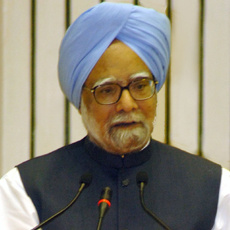India renews ambition for UN Security Council permanent seat
 New York - India's Prime Minister Manmohan Singh called Friday for expeditious negotiations to enlarge the UN Security Council, where India wants a permanent seat on a par with other nuclear powers.
New York - India's Prime Minister Manmohan Singh called Friday for expeditious negotiations to enlarge the UN Security Council, where India wants a permanent seat on a par with other nuclear powers.
Singh said the council, currently with 15 members, needs to change to reflect "contemporary realities of the 21st century."
India, Brazil, Germany, Japan and some African countries want to become permanent members on the council, whose membership now includes the United States, Russia, France, Britain and China - the five permanent members - and 10 members elected for two-year terms.
Negotiations in the UN General Assembly in the past 14 years have deadlocked over the number of new seats and the veto power of the permanent members.
"It is only a truly representative and revitalized UN that can become the effective focal point for the cooperative efforts of the world community," Singh said in an address to the UN General Assembly.
India has itself become a fledging nuclear power. Singh said the opening of international civil nuclear cooperation with India will have a positive impact on global energy security and on efforts to fight climate change.
The US House of Representatives could vote as early as Friday on a White House plan that would allow the United States to sell civilian nuclear technology and material to India. The Senate must also pass the agreement, signed by President George W Bush and Singh in 2006, but has not scheduled a vote.
He called for a nuclear disarmament that is "global, universal and non-discriminatory in nature."
"I reiterate India's proposal for a nuclear weapons convention prohibiting the development, production, stockpiling and use of nuclear weapons and providing for the complete elimination within a special time frame," he said.
Turning to developments in South Asia, Singh welcomed new democracies in Pakistan, Nepal and Bhutan. He said New Delhi stands ready to resolve all outstanding issues with Pakistan's new government of President Asif Ali Zardari, including the thorny problems in Jammu and Kashmir through peaceful dialogue.
Zardari, who addressed the assembly on Thursday, had called on Singh to resolve their dispute over Kashmir, a territory that straddles over the northern parts of India and Pakistan. Kashmiris have demanded autonomy for decades. (dpa)